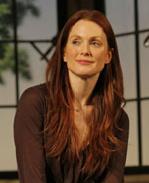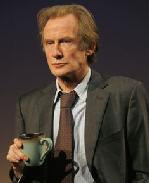SITE GUIDE
SEARCH
REVIEWS
FEATURES
NEWS
Etcetera and
Short Term Listings
LISTINGS
Broadway
Off-Broadway
NYC Restaurants
BOOKS and CDs
OTHER PLACES
Berkshires
London
California
DC
Philadelphia
Elsewhere
QUOTES
On TKTS
PLAYWRIGHTS' ALBUMS
LETTERS TO EDITOR
FILM
LINKS
MISCELLANEOUS
Free Updates
Masthead
Writing for Us
A CurtainUp Review
The Vertical Hour
By Elyse Sommer
|
In combat medicine there's this moment. . .after a disaster, after a shooting—there's this moment, the vertical hour, when you can actually be of some use— Nadia, in a middle of the night conversation with Oliver.
|
 
|
Julianne Moore and Bill Nighy
(Photo: Paul Kolnik)
(Photo: Paul Kolnik)
Julianne Moore, currently best known for her film work, may be the most luminescent presence on the Music Box Stage, but Bill Nighy, the British actor best known to American audiences as the viallain of Pirates of the Caribean: Dead Man's Chest takes the acting and charisma prize.
In The Vertical Hour, David Hare's new play, Nighy is Oliver Lucas, a tall, craggy-faced but still handsome middle-aged doctor. Except for the age difference he seems more suited to Nadia Blye, Moore's war correspondent turned Yale political studies professor character, than his son Philip (Dan Bittner). He's literate, witty and, yes, seductively charming. She's a beautiful, smart and accomplished woman in her mid thirties —being a feminist, she'd probably like those adjectives in reverse order. Yet, if Freud's theory that's mentioned in the play's first scene by one of Nadia's students is to be believed, we aren't who we claim to be and underneath we're all somebody else. And so underneath the ideas and personal histories that animate Nadia's and Oliver's conversations, lots of personal stuff bubbles and makes Philip's distress over their late night tête-a-tête understandable.
Philip may be overshadowed by his father, yet he's the man in Nadia's life, and most of the play takes place in Lucas senior's isolated Wales home to which Philip has brought his future bride. For dad's approval? Well, no not really. After all Philip, a successful British emigre to the U.S where he owns three wellness clinics, doesn't need his father's consent or approval. Thus, given the men's estrangement, Philip's reason for bringing Nadia to meet his father is obviously complicated and the weekend visit is fraught with unresolved tensions from the get-go. These tensions date back to Philip's being a pawn in a 60s style open marriage that turned into a disaster for his mother and exploded into a battle that left father and son deeply wounded as well. Philip is the least enigmatic member of this trio and Andrew Scott, seems too young for the role. Part of this may be attributed to the fact that adult children often seem to revert to their younger personas in the presence of powerful parents, but even so, this role somehow calls for a more physically imposing actor.
If all this makes The Vertical Hour sounds a bit like a domestic counterpart of a diplomatic attempt for two nations long at odds with each other to reconnect, right you are. Hare is after all a playwright passionately involved with the state of the world (His last play, Stuff Happens, was a docu-drama about the genesis of the Iraq War). Having an American journalist and college teacher, a British doctor and an Americanized proponent of a new kind of helping professionalism as his leading characters is a sure sign that The Vertical Hour is likely to combine Hare's political passions and his penchant for taking on institutions like the medical establishment and the American as well as British political hierarchy.
Like much of Hare's work, The Vertical Hour fits the "discussion play" tag often applied to George Bernard Shaw's most talky and issue-oriented dramas. There's a fair amount of often amusing small talk, but these people don't just talk; they hold forth at great length about love, death and marriage and, yes, the Iraq war (Nadia's sympathies with the oppressed and downtrodden made her initially support the Iraq invasion). Even the talented director Sam Mendes can't rein in the verbosity and if it weren't for Nighy much of this would fall flatter than the perennial pancake. The most impassioned exchanges take place under a grand Chekhovian country house tree supplied by set designer Scott Pask for outdoor breakfasts and middle of the night talkfests that unspool more intimate personal stuff. It is when the painful memories bring back the accident that ended Oliver's career as a high-powered specialist and Nadia's affair with a Polish foreign correspondent that this early morning hour takes on the meaning of the title (see the quote above this review). Talking about their painful pasts becomes the out in t"actually be of some use" indealing with the demons that haunt them.
A playwright with less box office appeal than Hare might not have the luxury of framing what is essentially a three-character play with two scenes that involve two additional actors. Thus Hare's first world premiere on these shores not only has the luminous Ms. Moore and the super-charismatic Mr. Nighy and wunderkind director Mendes to lend star power to the marquee but gets to open and close his play on a handsome second set (Nadia's wood panelled office at Yale) and with two more actors: Dan Bittner plays Dennis Dutton, a student challenging everything Nadia stands for and Rutina Wesley is Terri Scholes, a brilliant female student who is at a crossroad in her life that also neatly concludes the Nadia-Philip-Oliver triangle situation. The scene with young Dennis is a nice turn for Bittner and has Moore more natural and less of a mouthpiece for Hare's cornucopia of discussion points than what follows.
Hare nicely maneuvers the delicate balance of the personal and political rifts in Nadia's and the Lucas men's lives. His ideas, while not providing any solutions for a more thoughtful and reasonable world are as always intelligent and worth hearing again. However, one can't help wishing for more of the less ponderous exchanges. As an example of such less talky, more emotionally nuanced interaction there's the beginning of the late night scene (beautifully lit by Brian McDevitt) when Nadia comes across Oliver sitting in a lawn chair reading, with a batterypowered light attached to his book. The banter about Nixon's reaction to seeing the Great Wall of China (he said "This is a great wall") is funny and light, lending itself to more intense personal revelations and heightening the chemistry between the actors.
Interestingly, as this new Hare play is opening to much ado on Broadway, his ten-year-old Amy's View has has been revived in London, with Felicity Kendal in the role originated by Judy Dench. To read the review go here. Sad to say, in the West End as on Broadway, the straight play is also taking more and more of a back seat to musicals and light entertainment. That's why it's disappointing to have newly minted drama by a major modern playwright not pack more of a wallop.
|
THE VERTICAL HOUR Playwright: David Hare Directed by Sam Mendes Cast: Julianne Moore (Nadia Blye), Bill Nighy (Oliver Lucas), Dan Bittner (Dennis Dutton), Andrew Scott (Philip Lucas), Butina Wesley (Terri Scholes) Sets: Scot Pask Costumes: Ann Roth Lights: Brian MacDeVitt Sound: Christopher Cronin Running Time: 2 hours and 20 minutes, includes one intermission Music Box Theatre, 239 West 45th Street 212/239-6200 From November 9, 2006; opening November 30, 3006. Monday — Saturday @ 8pm, Wednesday & Saturday @ 2pm; Beginning December 4: Tuesday — Saturday @ 8pm, Wednesday & Saturday @ 2pm, Sunday @ 3pm Tickets: $96.25 to $76.25. Reviewed by Elyse Sommer based on November 27th press preview 20-week limited run shortened to a 3/11/07 closing date |

Easy-on-the budget super gift for yourself and your musical loving friends. Tons of gorgeous pictures.

Leonard Maltin's 2007 Movie Guide

At This Theater
Leonard Maltin's 2005 Movie Guide

 >
>

